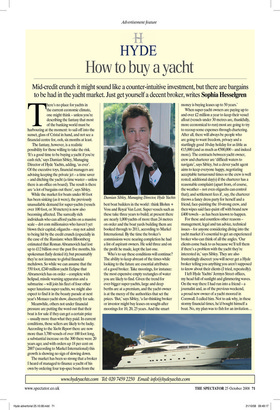How to buy a yacht
Mid-credit crunch it might sound like a counter-intuitive investment, but there are bargains to be had in the yacht market. Just get yourself a decent broker, writes Sophia Hesselgren There’s no place for yachts in the current economic climate, one might think – unless you’re describing the fantasy that most of the banking world must be harbouring at the moment: to sail off into the sunset, glass of Cristal in hand, and not see a financial centre for, ooh, six months at least.
The fantasy, however, is a realistic possibility for those willing to take the risk. ‘It’s a good time to be buying a yacht if you’re cash rich,’ says Damian Sibley, Managing Director of Hyde Yachts, adding, ‘as ever’. Of the executive toys, financial managers are advising keeping the private jet – a time saver – and ditching the yacht (a time waster – unless there is an office on board). The result is there are ‘a lot of bargains out there’, says Sibley.
While the market for boats under 80 foot has been sinking (as it were), the previously unassailable demand for super-yachts (vessels over 100 foot, or 30 meters) is now also becoming affected. The surreally rich individuals who can afford yachts on a massive scale – dot com millionaires who haven’t yet blown their capital; oligarchs – may not admit to being hit by the credit crunch (especially in the case of the Russians: when Bloomberg estimated that Roman Abramovich had lost up to £12 billion over the past five months, his spokesman flatly denied it); but presumably they’re not immune to global financial meltdown. So while we can assume that the 550 foot, £240 million yacht Eclipse that Abramovich has on order – complete with helipad, missile warning apparatus and a submarine – will join his fleet of four other super luxurious super-yachts, we might also expect to find it in the beauty parade at next year’s Monaco yacht show, discreetly for sale.
Meanwhile, others not under financial pressure are putting the word out that their boat is for sale if they can get a certain price – usually more than what they paid. In current conditions, those sellers are likely to be lucky. According to the Yacht Report there are now more than 3,700 vessels of over 100 foot long, a substantial increase on the 300 there were 20 years ago; and with orders up 18 per cent on 2007 (according to Markel International) this growth is showing no sign of slowing down.
The market has been so strong that a broker I heard of managed to finance a yacht of his own by ordering four top-spec boats from the best boat builders in the world : think Blohm + Voss and Royal Van Lent. Super vessels such as these take three years to build; at present there are nearly 1,000 yachts of more than 24 metres on order and the boat yards building them are booked through to 2011, according to Markel International. By the time the broker’s commissions were nearing completion he had a list of aspirant owners. He sold three and on the profit he made, kept the last one.
Who’s to say these conditions will continue? The ability to keep abreast of the times while looking to the future are essential attributes of a good broker. Take moorings, for instance: the most expensive empty rectangles of water you are likely to find. Given the trend for ever-bigger super-yachts, large and deep berths are at a premium, and the yacht owner is at the mercy of the authorities that set the prices. ‘But,’ says Sibley, ‘a far-thinking broker or investor might buy leases on sought-after moorings for 10, 20, 25 years. And the smart money is buying leases up to 50 years.’
When super-yacht owners are paying up to and over £2 million a year to keep their vessel afloat (vessels under 30 metres are, thankfully, more economical to run) most are going to try to recoup some expenses through chartering. After all, there will always be people who are going to want freedom, privacy and a startlingly good 10-day holiday for as little as €15,000 (and as much as €500,000 – and indeed more). The contracts between yacht owner, crew and charterer are ‘difficult waters to navigate’, says Sibley, but a clever yacht agent aims to keep everyone happy, negotiating acceptable turnaround times so the crew is well rested; additional day(s) if the charterer has a reasonable complaint (apart from, of course, the weather – not even oligarchs can control that); and settlement fees if , say, the charterer throws a fancy dress party for herself and a friend, face-painting the 10-strong crew, and then wipes said face-paint off with brand new £400 towels – as has been known to happen.
For these and countless other reasons – management, legal and tax advice, technical issues – for anyone considering diving into the yacht market it’s essential to get an experienced broker who can think of all the angles. ‘Our clients come back to us because we’ll tell them if there’s a problem with the yacht they’re interested in,’ says Sibley. They are also frustratingly discreet: you will never get a Hyde broker telling you anything you aren’t supposed to know about their clients (I tried, repeatedly).
I left Hyde Yachts’ Jermyn Street offices, my head full of sunlight and glimmering waves. On the way there I had run into a friend – a journalist and, as of the previous weekend, a proud new owner of a yacht moored in Cornwall. I called him. Not to ask why, in these stormy financial times, he’d bought himself a boat. No, my plan was to fish for an invitation...


















































































 Previous page
Previous page